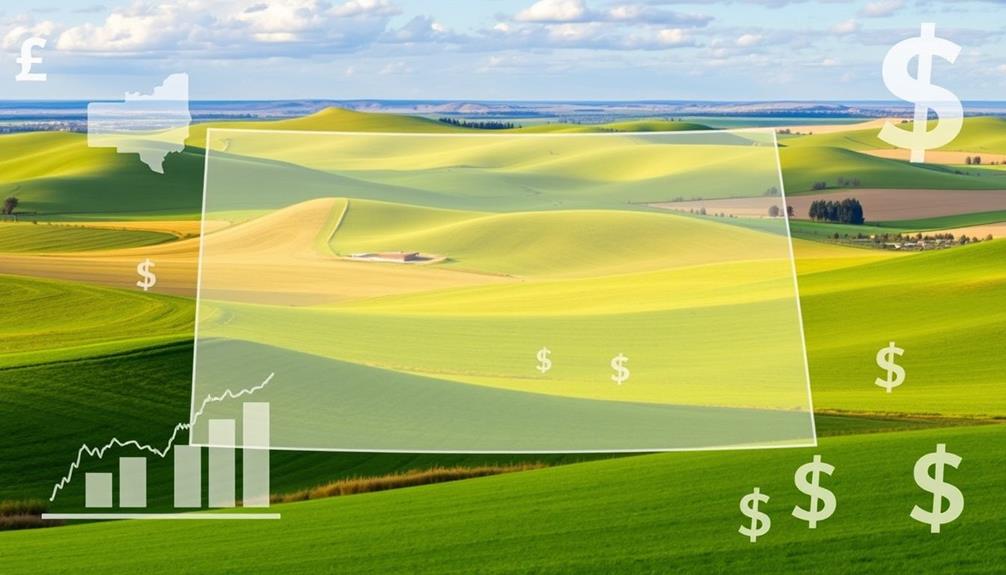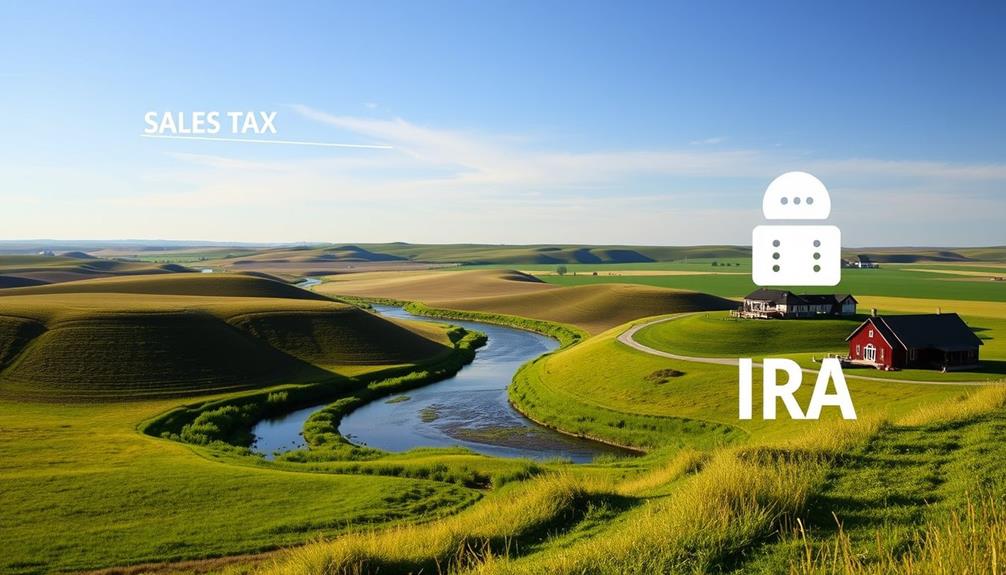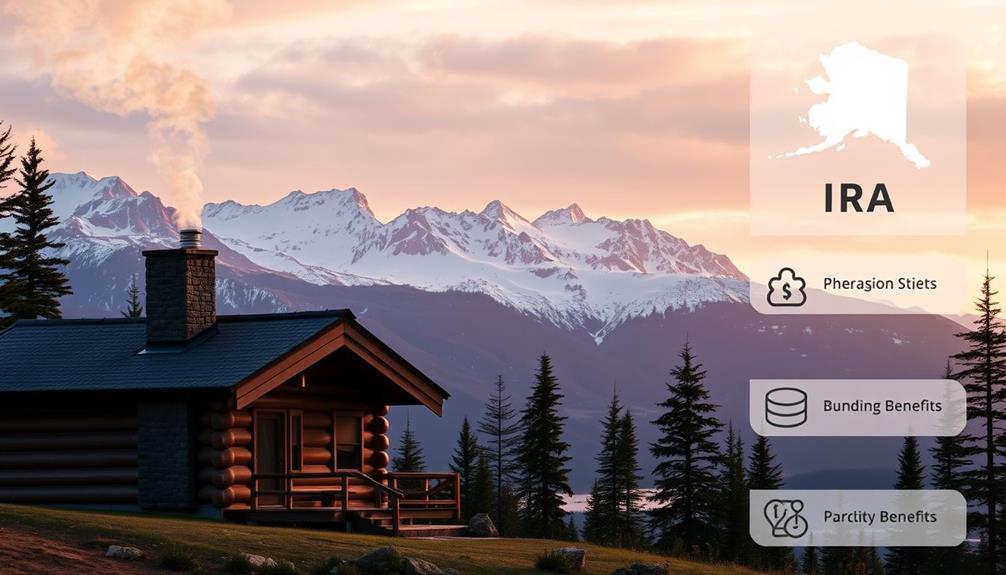In North Dakota, IRA withdrawals are subject to state income tax, with rates ranging from 1.95% to 2.5%. This means you need to consider the tax implications when planning your retirement income. While Social Security benefits are exempt from state tax, your IRA withdrawals do not receive the same advantage. It is important to strategize your withdrawals in order to reduce your tax burden and safeguard your financial stability. By focusing on non-taxable income and keeping an eye on your tax rates, you can improve your retirement budget. There is further information available on optimizing your retirement income in North Dakota.
Key Takeaways
- IRA withdrawals in North Dakota are fully taxable under state income tax, with marginal rates from 1.95% to 2.5%.
- Strategic planning for withdrawals can minimize tax burdens and enhance financial security in retirement.
- Social Security benefits are exempt from state income tax, increasing disposable income for retirees.
- Nearly all pension income is subject to state tax, necessitating proactive tax planning.
- Utilize the homestead credit and local tax relief programs to reduce property tax liabilities for seniors.
North Dakota Tax Overview

In North Dakota, understanding tax implications for IRA withdrawals is essential for your retirement planning. The state taxes most private retirement account income, including withdrawals from IRAs and 401(k)s. This means that when you make withdrawals, you'll be subject to North Dakota's marginal income tax rates, which range from 1.95% to 2.5%.
It's vital to factor this into your financial strategy, as it directly impacts your overall retirement income. Additionally, having a solid understanding of common financial terms can aid in making informed decisions regarding your retirement accounts.
On a positive note, Social Security benefits have been exempt from state income tax since 2021, providing additional relief for retirees. However, keep in mind that retirement income from IRA withdrawals is still taxable.
Besides income taxes, consider the property tax rate in North Dakota, which is slightly below the national average at 0.99%. This can influence your overall retirement expenses.
If you're a senior, you might qualify for the North Dakota homestead credit, which can further reduce your property taxes. By understanding these tax implications, you can better plan for an enjoyable and financially secure retirement in North Dakota.
IRA Withdrawal Taxation

Withdrawing funds from your Individual Retirement Accounts (IRAs) can greatly impact your financial situation in North Dakota. Unlike Social Security benefits, which are exempt from state income tax, IRA withdrawals are fully taxable. This means you'll need to plan carefully to manage your tax liabilities effectively.
Additionally, reflect on the potential benefits of diversifying your retirement portfolio with options like gold IRAs, which can offer long-term investment protection against inflation and market downturns.
Here are some key points to keep in mind:
- IRA withdrawals are subject to North Dakota's state income tax, with rates ranging from 1.95% to 2.5% for single filers.
- Your total taxable income will determine your marginal tax rate, so it's important to account for all sources of retirement income.
- Strategic withdrawal planning can help minimize your overall tax burden and maximize your retirement income.
- Understanding these tax implications is vital for optimizing your financial situation and ensuring a comfortable retirement.
Social Security Benefits

If you're considering retirement in North Dakota, you'll be pleased to know that Social Security benefits are exempt from state income tax.
This tax break boosts your disposable income, allowing you to spend more on living expenses and leisure activities.
Additionally, investing in a Gold IRA can provide financial security and diversification for your retirement portfolio.
Tax Exemption Benefits
Retirees in North Dakota can greatly benefit from the state's full exemption of Social Security benefits from state income tax, a change implemented in 2021. This tax exemption creates a significant advantage for those relying on Social Security as a primary source of retirement income, allowing you to keep more of your hard-earned money.
Here are some key tax exemption benefits you can enjoy:
- Increased Disposable Income: With no state income tax on Social Security benefits, you can use your funds for daily expenses or savings.
- Enhanced Quality of Life: More disposable income means you can spend on necessities and leisure activities without worrying about state tax burdens.
- Attractiveness for Retirees: North Dakota's exemption makes it a favorable option for retirees seeking to maximize their finances.
- Contrast with IRA Withdrawals: Unlike Social Security benefits, IRA withdrawals are subject to state income tax, making the exemption even more significant.
Impact on Disposable Income
The exemption of Social Security benefits from state income tax in North Dakota has notably boosted disposable income for many. Since 2021, retirees can keep more of their hard-earned money, enhancing their quality of life.
This financial relief allows you to allocate funds toward living expenses and healthcare costs without worrying about state taxes eating into your income.
With Social Security benefits untaxed, you have more flexibility in managing your retirement income. This is particularly important when considering the tax implications of other sources, like 401(k)s and IRA withdrawals.
Unlike your Social Security benefits, these forms of retirement income are subject to state income taxes, which can meaningfully impact your overall financial strategy.
Economic Growth Contribution
Exempting Social Security benefits from state income tax has become a game-changer for North Dakota's economy. Since 2021, this exemption has provided retirees with a significant financial advantage, enhancing their disposable income and driving local economic growth.
By allowing retirees to keep more of their retirement income, North Dakota has fostered an environment that encourages increased consumer spending.
This tax-friendly approach not only supports individual financial well-being but also attracts more retirees to the state. As more people relocate to North Dakota, the benefits of this exemption ripple through the community, promoting overall economic vibrancy.
Here are some key points to reflect on:
- Enhanced disposable income leads to increased spending on local goods and services.
- Retirees contribute to local businesses, boosting job creation and economic activity.
- A growing population improves community services and infrastructure.
- The overall quality of life for retirees is elevated, attracting even more individuals.
Taxation on Pension Income

In North Dakota, nearly all pension income is subject to state income tax, impacting your overall retirement income. This means you need to include your pension distributions when calculating your taxable income. Most private and public pensions in the state are taxable, with no specific exemptions available. The marginal state income tax rates for pensions range from 1.95% to 2.5%, depending on your income bracket.
Understanding the taxation on pension income is vital for effective retirement financial planning. You'll want to strategize your withdrawal plans to minimize the tax impact on your pension income. By considering the overall tax landscape, you can make informed decisions that enhance your financial situation during retirement.
It's essential to examine all aspects of your income, including Social Security benefits and any other earnings, as these can influence your state income tax obligations.
Prioritize thorough planning to guarantee that your retirement funds last as long as possible while minimizing tax liabilities. As you evaluate your finances, remember that being proactive about your pension's tax implications can lead to significant savings and a more secure retirement.
Property Tax Implications

When planning your finances in North Dakota, it's important to contemplate how property taxes will affect your budget.
With an average property tax rate of 0.99%, you might find it more manageable than in other states.
Plus, if you qualify for the senior property tax credit, you could greatly lower your tax burden even further.
Senior Property Tax Credit
Understanding the Senior Property Tax Credit can greatly enhance your financial stability as you navigate retirement in North Dakota. This credit, often referred to as the homestead credit, provides essential property tax relief for seniors aged 65 and older. By reducing your property tax liability based on income and home value, you can considerably lower your expenses.
To qualify for the senior property tax credit, consider the following factors:
- Your income level
- The value of your home
- Residency status
- Specific guidelines from the North Dakota Office of State Tax Commissioner
In 2023, the average property tax payment in North Dakota is about $2,078, which is slightly below the national average. This makes it more manageable for retirees like you.
Additionally, local governments may offer further tax relief programs, adding another layer of support to help you manage property tax expenses.
Average Property Tax Rates
Property tax rates play a significant role in your overall financial picture, especially as a retiree in North Dakota. With an average property tax rate of just 0.99%, this state is considered relatively affordable for property owners compared to the national average. You can expect to pay around $2,078 annually in property taxes, although this amount varies by county and property value.
Many counties in North Dakota boast median home values under $209,900, which helps keep your property tax liabilities low. As a retiree, you may qualify for the homestead credit, providing significant relief based on your income and age. This program can dramatically lower your property taxes, making homeownership more manageable during retirement.
Additionally, local tax relief programs might be available to further reduce your property taxes. It's crucial to explore these options, as they can provide further financial support.
Homestead Credit Benefits

How can the North Dakota homestead credit benefit you as a homeowner? This program offers significant property tax relief, helping to ease the financial burden of homeownership.
If you're a senior or have a disability, you may qualify for enhanced benefits, making it easier to manage your retirement income.
To be eligible, you must meet specific income thresholds and own the property for which you're claiming the credit.
Here are some key benefits of the homestead credit:
- Reduced Property Taxes: Lower your annual property tax payment, which averages around $2,078 in North Dakota.
- Enhanced Benefits for Seniors: Seniors aged 65 and older can access greater financial relief through the homestead credit.
- Disability Considerations: Individuals with disabilities may also qualify, ensuring support for a diverse range of homeowners.
- Encouragement for Retirees: The program is designed to attract retirees to North Dakota, boosting their disposable income during retirement.
Sales Tax Considerations

What do you need to know about sales tax as a retiree in North Dakota?
While sales tax doesn't apply directly to your IRA withdrawals, it's important to factor it into your overall budget for retirement spending. North Dakota has an average sales tax rate of 5.96%, which is relatively low compared to many other states, but local municipalities may impose additional taxes, raising the total rate in specific areas.
When you withdraw funds from your IRA, you'll need to take into account how much of that money will go toward sales tax on your purchases.
This affects your disposable income and can impact your financial planning. It's vital to understand what goods and services are subject to sales tax, as this can influence your overall retirement spending.
Strategic Withdrawal Planning

Understanding sales tax implications is just one part of your financial planning as a retiree in North Dakota. A well-thought-out withdrawal strategy can greatly influence your tax liability, particularly when it comes to withdrawals from retirement accounts. Since state income tax applies to IRA and 401(k) withdrawals, you should prioritize your income sources wisely.
Consider these key points in your strategic planning:
- Prioritize non-taxable income: Since Social Security benefits are exempt from state income tax, consider withdrawing from taxable accounts first.
- Manage taxable income: Take distributions from taxable accounts early to prevent pushing yourself into a higher tax bracket later.
- Utilize pension income exemptions: Certain pension incomes may have tax exemptions that can help optimize your overall withdrawal strategy.
- Monitor your marginal tax rate: The state income tax rate for single filers ranges from 1.95% to 2.5%. Planning your withdrawals with this in mind can reduce your overall tax burden.
Potential Financial Challenges

Maneuvering through retirement in North Dakota presents several financial challenges, particularly due to the state income tax on IRA and 401(k) withdrawals. The state income tax ranges from 1.95% to 2.5%, which can considerably impact your budget, especially if you rely heavily on retirement account income for living expenses. These potential financial challenges can reduce your overall disposable income, making careful financial planning essential.
To illustrate the impact of state income tax on your retirement finances, consider the following table:
| Income Bracket | State Income Tax Rate | Impact on IRA Withdrawals |
|---|---|---|
| $0 – $40,000 | 1.95% | Lower tax liability |
| $40,001 – $80,000 | 2.0% | Moderate tax liability |
| $80,001 – $125,000 | 2.5% | Higher tax liability |
| $125,001+ | 2.5% | Highest tax liability |
The absence of tax exemptions for IRA withdrawals necessitates strategic financial planning to mitigate tax liabilities and maximize your retirement income. Addressing these challenges early on can lead to a more secure retirement.
Frequently Asked Questions
Do You Pay State Income Tax on IRA Withdrawals?
Yes, you pay state income tax on IRA withdrawals. The tax rate ranges from 1.95% to 2.5%, depending on your income level. It's important to take into account this when planning your retirement income strategy.
What States Require Tax Withholding on IRA Distributions?
Did you know that about 11 states require tax withholding on IRA distributions? States like California and New York impose higher rates, so always check your state's specific policies to avoid unexpected tax burdens.
What Is the Capital Gain Exclusion in North Dakota?
In North Dakota, there isn't a specific capital gain exclusion. You'll generally pay the same income tax rate on capital gains as regular income, but you can offset them with capital losses. Always check updated guidelines!
How Do States Tax Retirement Income?
Think of retirement income as a puzzle; each state holds different pieces. Some tax your Social Security, while others don't. You'll need to navigate these rules to maximize your benefits and keep more cash in hand.
Conclusion
Maneuvering state tax implications for IRA withdrawals in North Dakota can feel like walking a tightrope. By understanding how taxes on IRA withdrawals, Social Security, and pensions interact, you can balance your financial needs with potential liabilities. Keep an eye on property taxes and sales tax, too. With strategic planning, you can keep your financial footing steady, ensuring your retirement savings work for you rather than against you. Stay informed, and you'll find your way to a secure financial future.









